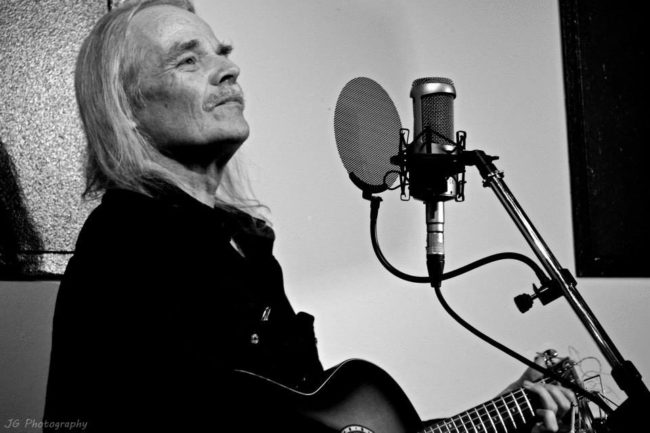25 Feb Charlie Phillips made an impact on friends—and Nova Scotia history

Encounters with Charlie Phillips, the singular Halifax folk musician who died over the weekend, left me with a smile on my face and fresh insights to puzzle over.
Charlie played in a succession of lightly employed jug bands, folk groups, and blues ensembles. His musical career was only marginally profitable, but he endured the resulting poverty with reliable good cheer. When he had no paying gig, you could find him at Bearly’s Monday night folk jam. To friends, admirers, and fellow tavern-goers, he was a sweet soul.
Years ago, poverty brought Charlie to the attention of Nova Scotia’s highest court, and eventually to the Supreme Court of Canada. Along the way, he scored an early legal precedent for equality of the sexes.
A decade later, he took on every prominent political figure in the province, including the leaders of all three political parties, and beat them.
He has to be the least known historically influential figure of our time.
In the 1980s, Nova Scotia was one of only three provinces that offered social assistance to eligible single mothers, but not to single fathers. When the Charter of Rights and Freedoms outlawed sexual discrimination, Ontario and Manitoba promptly brought their laws into compliance, but Nova Scotia, guided by Social Services Minister Edmund Morris, refused.
Charlie took the province to court.
Mr. Justice Merlin Nunn found the Family Benefits Act in clear violation of the Charter, but refused to play legislator by “reading up” the word “mother” to mean “parent.” Instead, he declared the Act’s family benefits provision null and void, and urged the legislature to fix the act.
Morris fulminated, denouncing Dal Legal Aid as, “a virtual training ground for the NDP.” He threatened to retaliate against Charlie’s victory by depriving all mothers of social assistance for their children. (Morris was a mean spirit when it came to citizens on social assistance. He once responded to a Coast article criticizing provincial welfare policies by dipping into the author’s social services file and, from the floor of the Legislature, speculating about the paternity of her child.)
The Court of Appeal upheld Nunn’s decision, including his refusal to re-write legislation. Under fierce criticism, the province relented and re-wrote the law.
Charlie had won.
Years later, in Schachter v. Canada, the Supreme Court of Canada rebuked the Nova Scotia Courts for refusing to read in rights for single fathers. It termed the rulings in Charlie’s case, “as satisfied with equal graveyards as equal vineyards.” Future courts, it said, should “act in a manner more consistent with the basic purposes of the Charter.”
Charlie returned to public life briefly in 1992, heading up the Nova Scotia No Committee during the Charlottetown Accord referendum. Premier Donald Cameron, Opposition Leader John Savage, and NDP leader Alexa McDonough—together with the entire provincial establishment—lined up on the other side.
When the votes were counted in Nova Scotia, Charlie’s side won, 51.2 percent to 48.8 percent.
In recent years, Charlie embraced Twitter with his characteristic intelligence, pumping out tweets about scientific oddities, gags, music, and politics. He took an intense interest in U.S. politics, a topic on which he was exceptionally well read. His last two tweets, on January 29, were a joke photo of a British cop named P.C. Rob Banks, and Alexandria Ocasio-Cortez’s first podcast as a Congressperson.
Charlie’s twitter handle was @fimbriate, which means, “having a thin border of hair.” Perhaps Charlie thought of himself as a fringe character, but to his wide and diverse circle of friends, he was central to Halifax at its best. If there is any justice, history will regard him as such.
No obituary has appeared, and the outpouring of tributes on Charlie’s Facebook page includes no information about the precise date or cause of his death. I don’t know his age, but I would guess less than 70. He leaves a son, Piper, on whose behalf he went to court 33 years ago.
